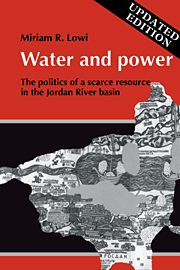Book contents
- Frontmatter
- Contents
- List of illustrations
- List of tables
- Preface
- Preface to the paperback edition
- List of abbreviations
- 1 Introduction: conflict and cooperation in international river basins
- Part I Riparian dilemmas
- Part II The Jordan waters conflict
- 4 The Johnston mission to the Middle East (1953–1956)
- 5 Perception and misperception: the Jordan waters crisis (1964) and the onset of war
- Part III The Jordan basin since 1967
- Appendix 1 US involvement in water development in the Jordan basin
- Appendix 2 The unified development of the water resources of the Jordan Valley region
- Appendix 3 The Arabs' plan for development of water resources in the Jordan Valley
- Appendix 4 The Cotton plan for the development and utilization of the water resources of the Jordan and Litani River basins
- Appendix 5 Annex II: from, Treaty of Peace Between the State of Israel and the Hashemite Kingdom of Jordan
- Notes
- Select bibliography
- Index
- Cambridge Middle East Library
4 - The Johnston mission to the Middle East (1953–1956)
Published online by Cambridge University Press: 08 December 2009
- Frontmatter
- Contents
- List of illustrations
- List of tables
- Preface
- Preface to the paperback edition
- List of abbreviations
- 1 Introduction: conflict and cooperation in international river basins
- Part I Riparian dilemmas
- Part II The Jordan waters conflict
- 4 The Johnston mission to the Middle East (1953–1956)
- 5 Perception and misperception: the Jordan waters crisis (1964) and the onset of war
- Part III The Jordan basin since 1967
- Appendix 1 US involvement in water development in the Jordan basin
- Appendix 2 The unified development of the water resources of the Jordan Valley region
- Appendix 3 The Arabs' plan for development of water resources in the Jordan Valley
- Appendix 4 The Cotton plan for the development and utilization of the water resources of the Jordan and Litani River basins
- Appendix 5 Annex II: from, Treaty of Peace Between the State of Israel and the Hashemite Kingdom of Jordan
- Notes
- Select bibliography
- Index
- Cambridge Middle East Library
Summary
In our discussion, in chapter 2, of the environment of conflict, we described the political landscape in the Jordan basin. We suggested that the roots of conflict over the waters of the river system lay in the convergence of two phenomena: (1) the fact of resource scarcity in Palestine, and (2) Zionist efforts to establish a Jewish national home in Eretz Yisrael, where there lived an indigenous Arab population. We then outlined the various efforts at land and water development in the Jordan basin from the beginning of Jewish immigration to Palestine until mid-century. We noted that immediately following the 1948–49 war, both Israel and Jordan experienced massive influxes of population. The resource bases of the two newly founded states were strained considerably.
In the aftermath of the war, the concurrence of three critical factors — (1) the absolute need of both Israel and Jordan to develop land and water resources, (2) the fact of water scarcity in the basin relative to needs, and (3) adversarial relations among the riparian states — extended the scope of the Arab—Jewish conflict and crystallized what was to become a central issue in the Jordan waters dispute: on what basis should the waters of the Jordan system be shared? How much water should go to each side, and according to what principle?
In this chapter, we focus on the first, and perhaps, most important episode of riparian dispute in the Jordan basin in the post-1949 period: the United States-sponsored Johnston mission to the Middle East.
- Type
- Chapter
- Information
- Water and PowerThe Politics of a Scarce Resource in the Jordan River Basin, pp. 79 - 114Publisher: Cambridge University PressPrint publication year: 1993
- 1
- Cited by

